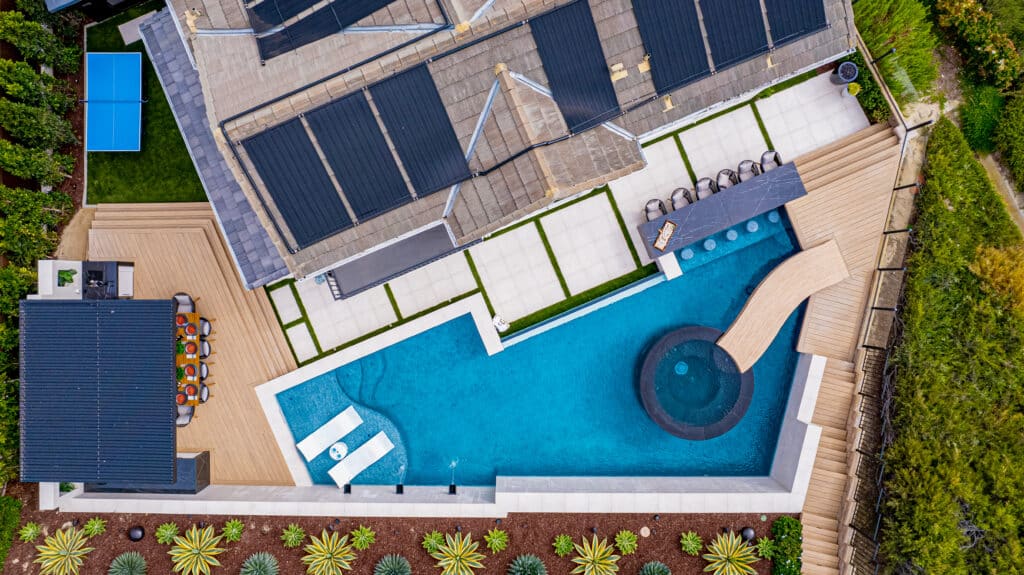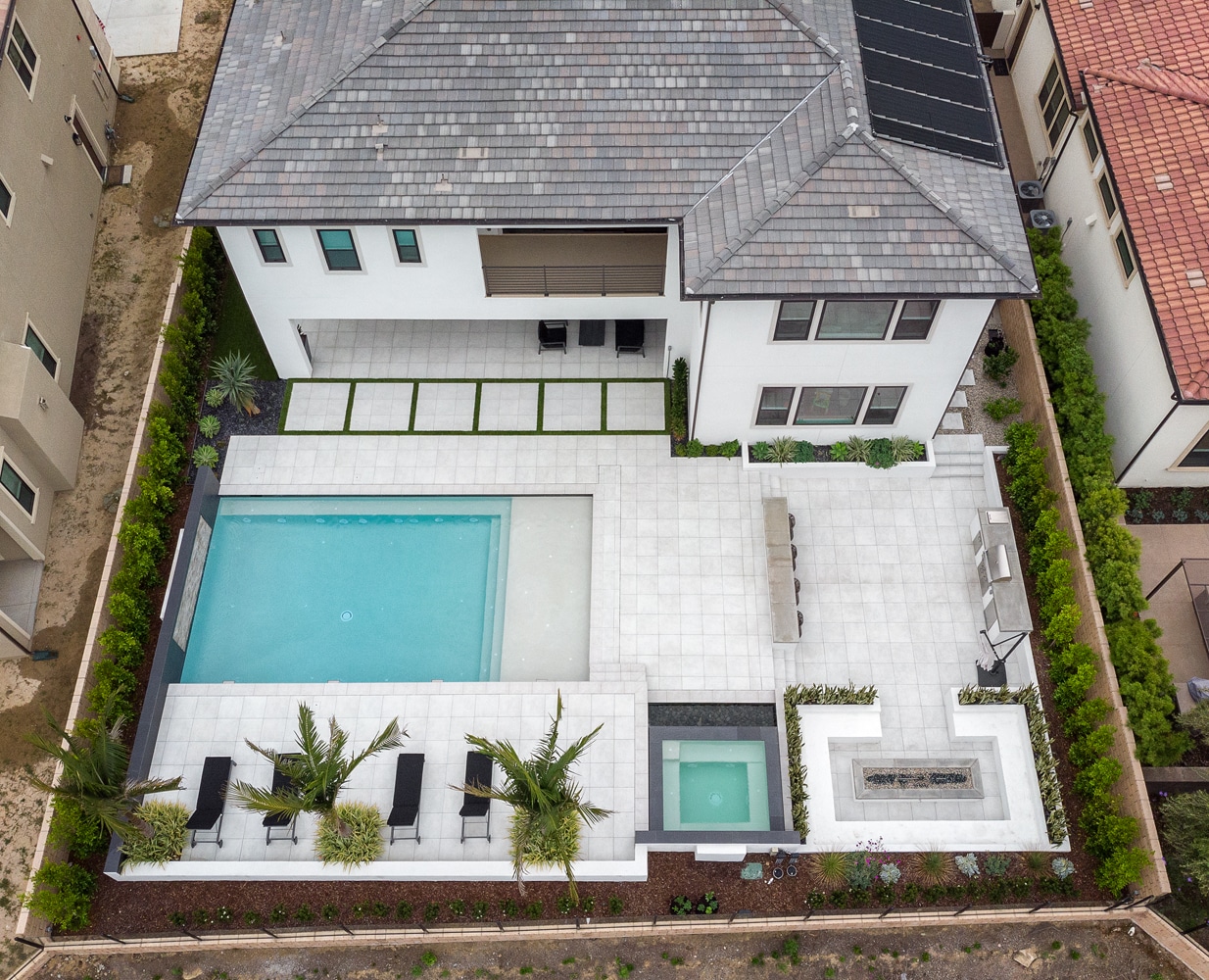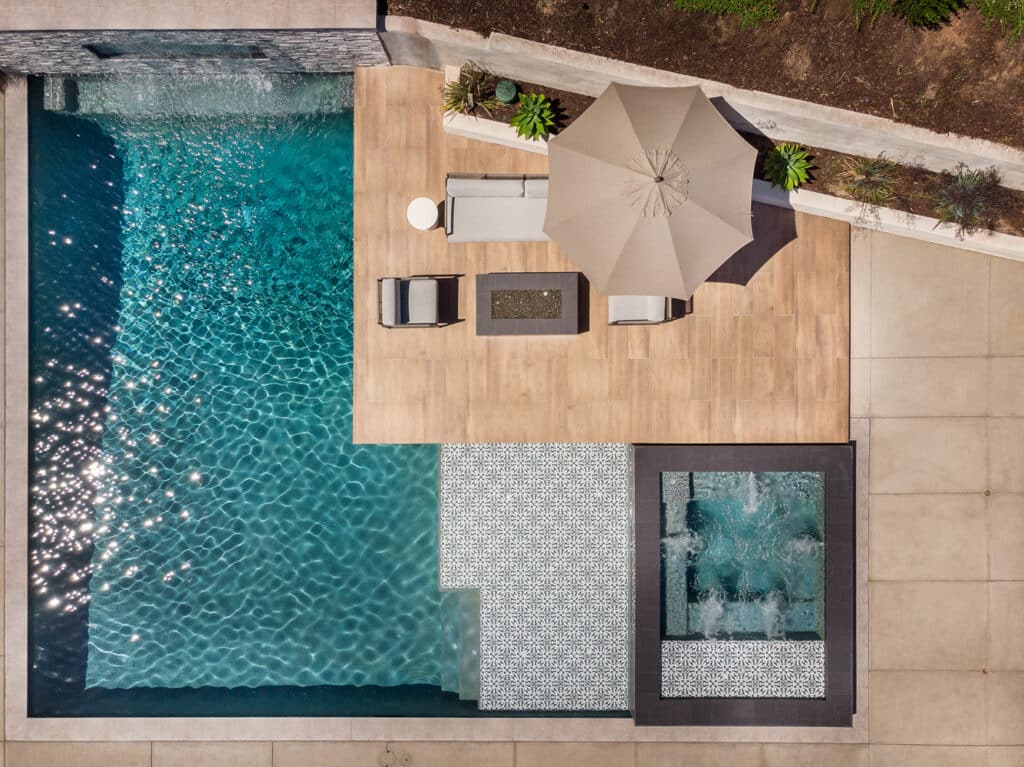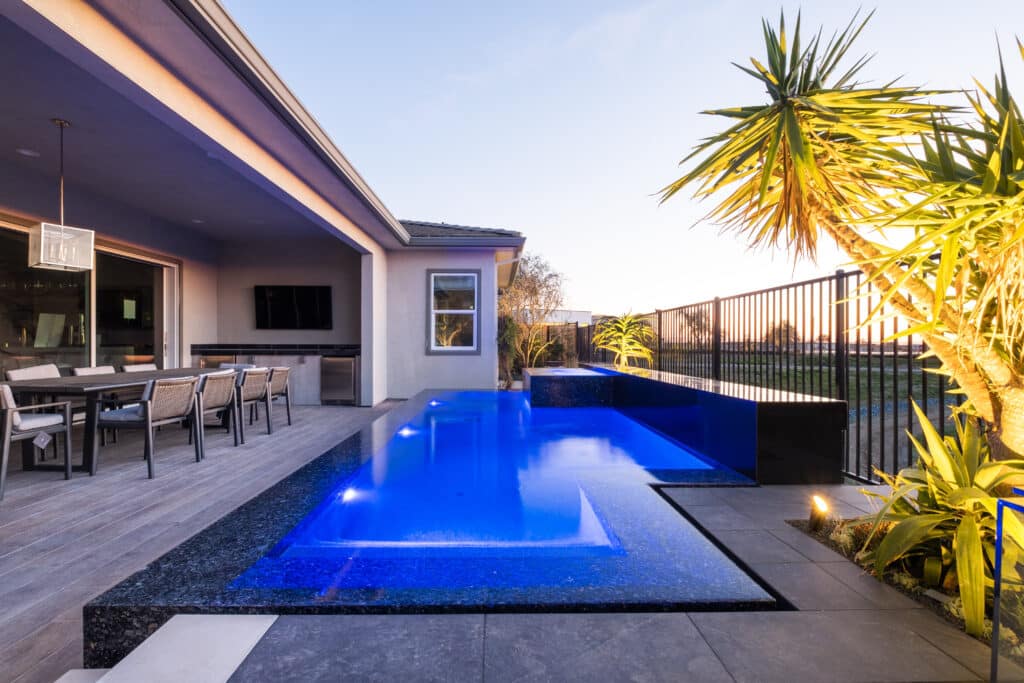Learn About Inground Pools
Inground Pools
When determining what type of inground pool to build, you have three options to consider: gunite, fiberglass or vinyl. Each pool type has unique benefits and considerations.
The 3 Types of Inground Pools: Gunite, Fiberglass, & Vinyl
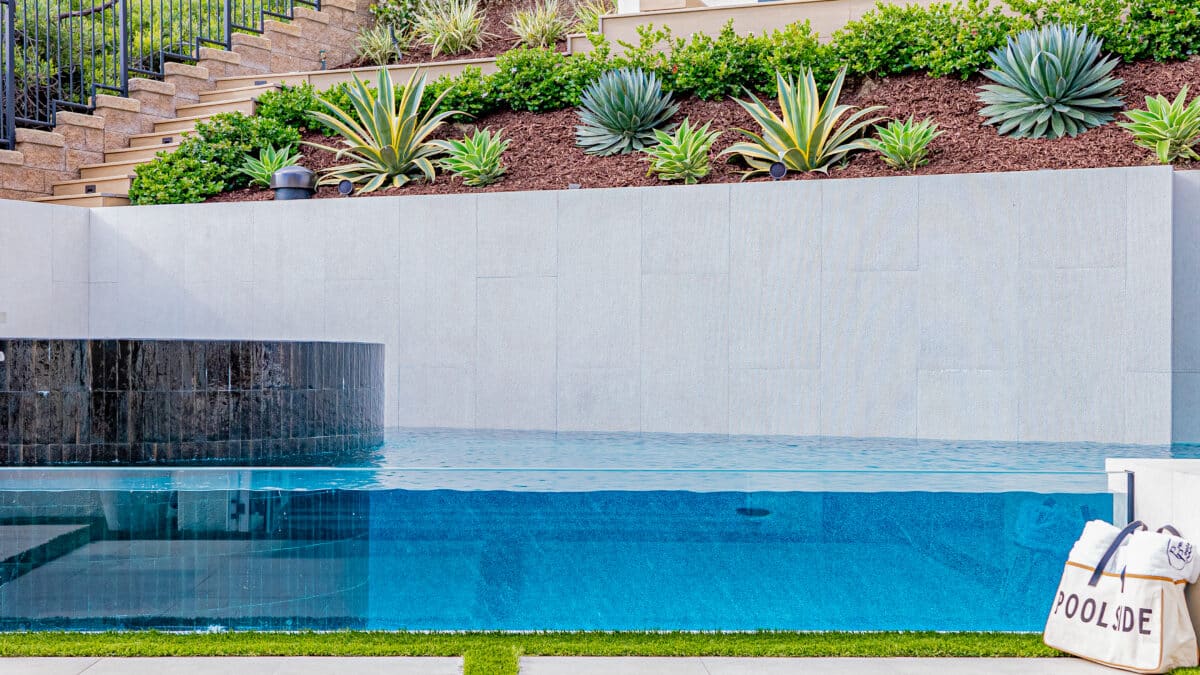
Gunite Pools
Gunite, sometimes called shotcrete, is a type of concrete that is sprayed through a high-pressure nozzle. It creates the longest-lasting kind of pool, and it’s also the most customizable type of pool. Check out the many designs you can achieve with gunite.
View Gunite PoolsConstruction Process
First comes excavation. Then we stabilize that pool-shaped hole with reinforced steel bars, spraying them with gunite through a high-pressure nozzle and finishing the surface by troweling. Finally, we allow it to cure until the gunite hardens into your pool shell.
Customization
The sky’s the limit when it comes to the shape, size, and depth of a gunite pool. From geometric to freeform, every add-on feature you can imagine – if you can dream it, we can build it.
Durability
Gunite is the longest-lasting out of the three inground pool types, and if properly maintained, can be an investment that’s around for generations.
Maintenance
Proper maintenance of your pool is critical to achieving the durability mentioned above. To prevent algae blooms, you’ll need to brush your pool regularly, and how regularly depends on what part of the country you live in. A local Premier office can help you determine the best schedule or sign you up for regular pool service (if available in your area).
Surface Finish
You have many options when it comes to the finish. A plaster finish is common, but it can be a rough surface on your feet if you spend a lot of time in your pool. A pebble aggregate finish looks fantastic and typically lasts a lifetime. Glass tiles around your pool’s perimeter are another great choice. They can make your water appear as blue as the ocean.
Costs
Concrete pools are the most expensive upfront, but they’ll last longer than the other pool material types. And the fact that gunite pools are constructed on-site means you’ll save on delivery fees.
Installation Time
Depending on features and size, a gunite installation can take two to three months on average – much longer than Fiberglass and Vinyl.
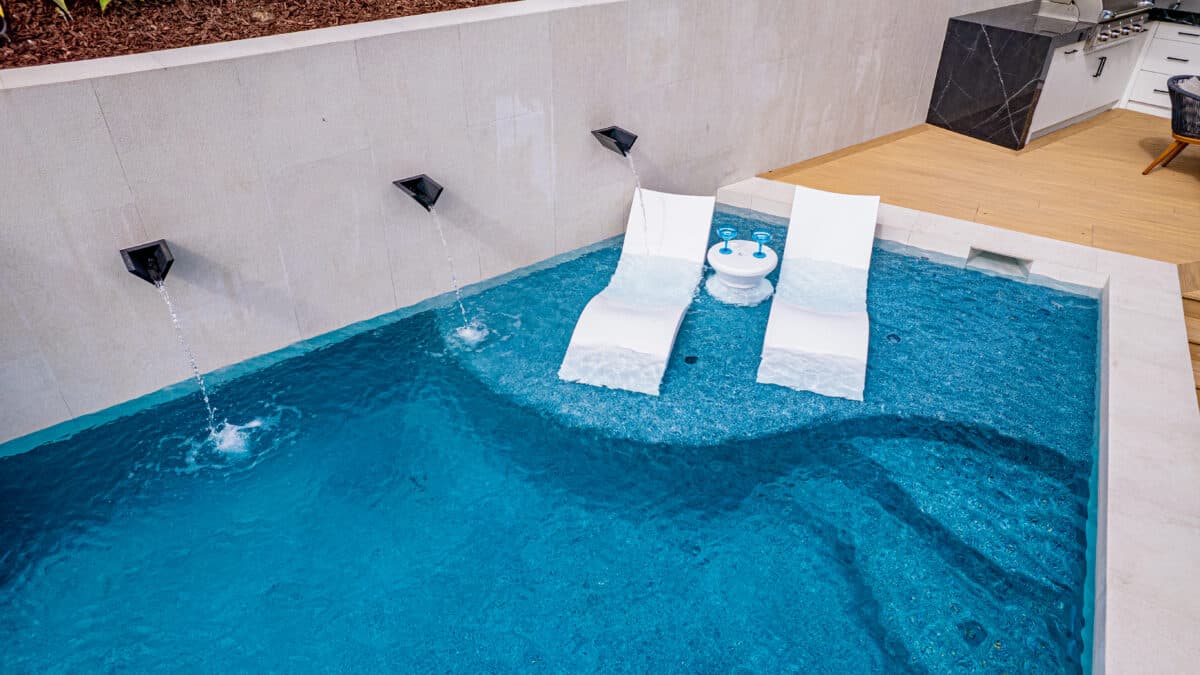
Fiberglass Pools
Fiberglass is quick to install and will last for decades. Just a couple of the reasons the fiberglass pool market has continued to skyrocket over recent years.
View Fiberglass PoolsConstruction Process
Fiberglass pool installation begins with a factory-manufactured pool shell. The shell is then transported to the backyard pool site. Any seating areas, steps, tanning ledges, sun decks, or other pool elements come built with the pool shell. You will not have to forego swimming pool features, as they can be incorporated into your design.
Customization
While fiberglass pool shells come in a variety of shapes and sizes, they are prefabricated. Therefore, you may have to make some compromises on your initial design ideas. However, for basic designs or small pools, fiberglass can be your best choice.
Durability
The pre-molded fiberglass inground pool shell has various layers of chopped fiberglass, which is reinforced with polyester resin, vinyl ester resin, and glass mesh materials for added strength. Since their first debut, fiberglass pools have come a long way and can sometimes surpass the durability of concrete pools.
Maintenance
Fiberglass pools are ideal for a saltwater system since there is no metal incorporated that could succumb to rust. Waterline cleaning or brushing is relatively easy in comparison to concrete. The risk of algae growth is limited.
Surface Finish
Fiberglass pools have a gel coat surface that is smooth to the touch. Unlike concrete, fiberglass does not feel uncomfortable on bare feet. The non-abrasive surface also helps prevent algae growth.
Costs
The initial investment in a fiberglass pool is similar to gunite and higher than vinyl. You also need to pay the delivery costs to get the pool shell from the factory to your home. Fiberglass pools come fortified with extremely durable materials, which makes them hard to break. They are flexible and tough with the right installation, and if damages do occur, they are typically easy to repair.
Installation Time
One of the biggest benefits of fiberglass pools is how quickly they can be obtained. Once the shell arrives, installation takes very little time.
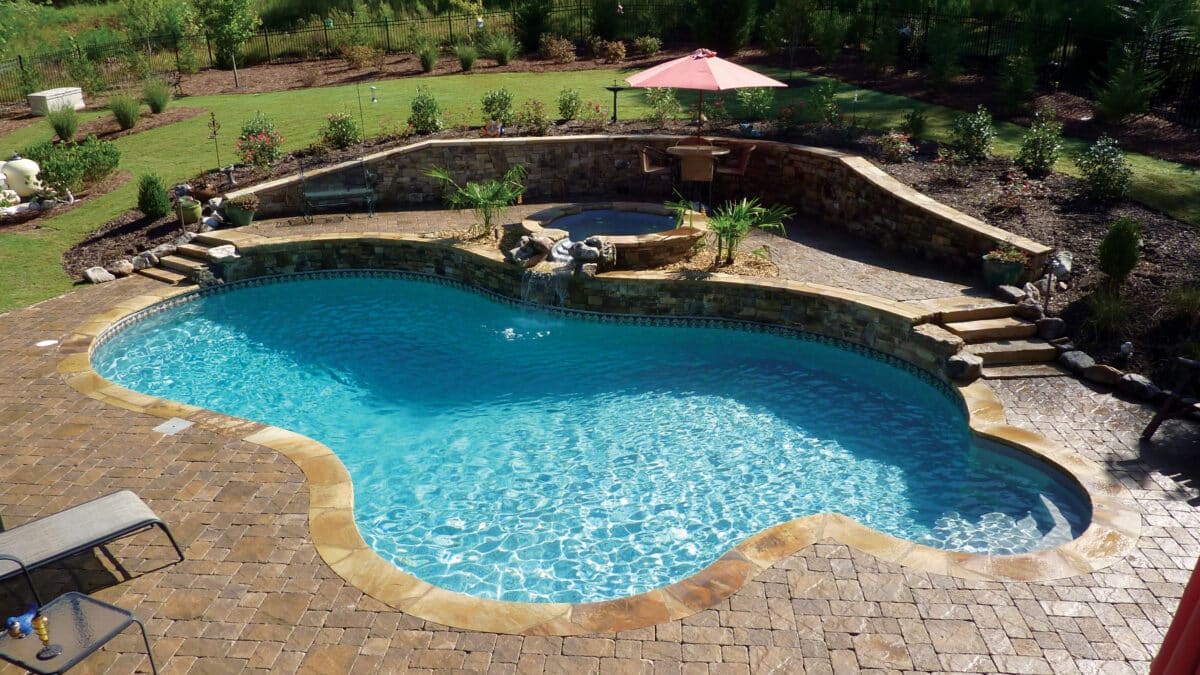
Vinyl Pools
Vinyl liner swimming pools offer more flexibility in design than fiberglass, and the installation process is more straightforward than with gunite inground pools.
View Vinyl PoolsConstruction Process
The construction process for vinyl pools is similar to that of gunite, but instead of applying gunite, the builders add a custom-made vinyl liner sheet onto the galvanized steel pool wall panels. The liner is vacuumed and the surface tested for possible air leaks. Pre-decking steel and an interior block wall are installed as the final step in the process.
Customization
In terms of shapes, sizes, and designs, the sky’s the limit with vinyl swimming pools. Vinyl pools are highly flexible and customizable, which means you can incorporate a wide array of design elements. Although most pools are rectangular, you can get a custom-built pool with fluid lines or eccentric curves. Vinyl liners are available in varying thicknesses.
Durability
Technological advancements have made vinyl pool liner structures much more durable than in the past. However, getting the right thickness is crucial as the liner could tear easily. Taking care of a vinyl pool is critical to its lifespan. However, even with proper care, a vinyl liner has a lifespan of approximately 5-9 years.
Maintenance
Fiberglass pools are ideal for a saltwater system since there is no metal incorporated that could succumb to rust. Waterline cleaning or brushing is relatively easy in comparison to concrete. The risk of algae growth is limited.
Surface Finish
Compared to other pool types, vinyl may require more care. The effects of direct sunlight for prolonged periods may cause the liner to sag or make the surface wrinkly. If you do not fix these issues promptly, they could lead to significant repairs. On the other hand, brushing or sweeping is relatively more relaxed as there is fewer algae buildup.
Costs
Vinyl liners are the most affordable option among the three types of pools. Even the installation costs are far lower than those of gunite pools of similar size. On average, you may have to spend a good amount of money on vinyl liner replacements. Typically, the liner needs to be replaced every five to nine years.
Installation Time
Within four to eight weeks, you can have your vinyl pool ready for swimming. A vinyl liner pool is also easy to install, with ready-to-assemble kits available on the market.
Want to talk to us about your new pool, remodel, or other projects? Please fill out the form below and we'll be in touch as soon as possible.

